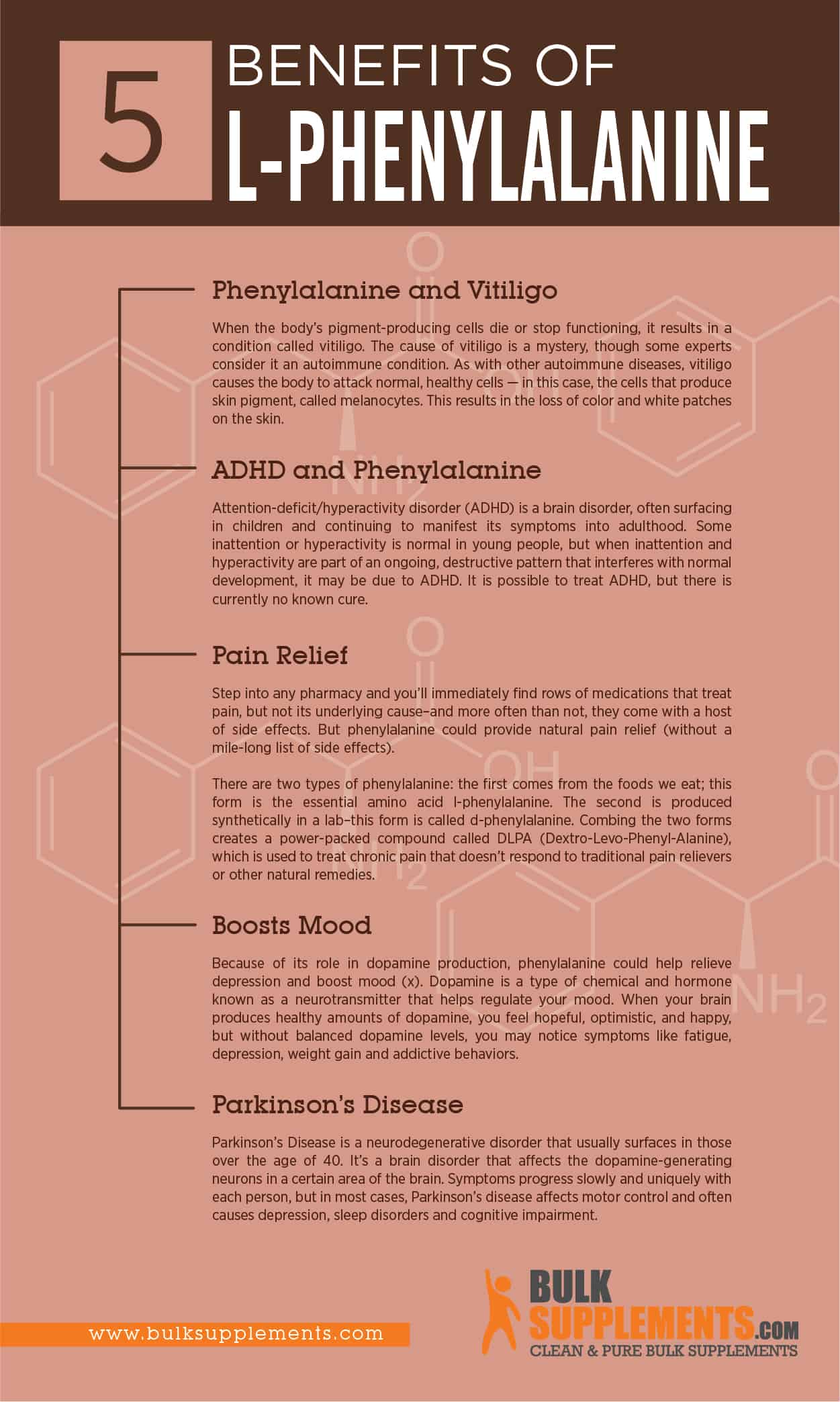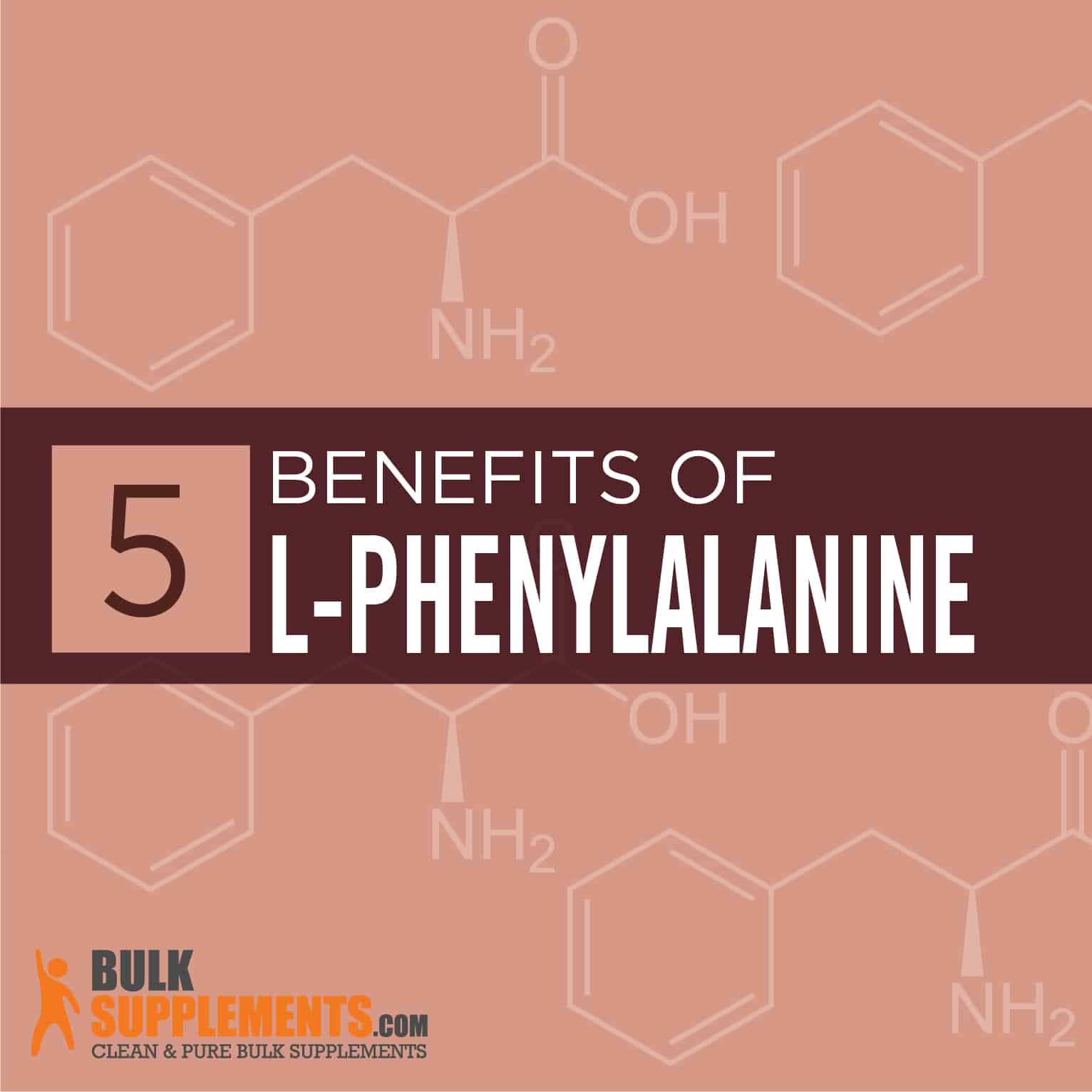Updated: 12/6/23
Do you feel like no matter how many coffees you have, your energy and motivation levels just aren’t what they used to be? If this sounds familiar, then there is some good news! L-Phenylalanine (LPA) is an Essential Amino Acid that may deliver the energy boost, increased focus, and improved mood you are looking for. In addition to these potential mental benefits, evidence suggests there are metabolic advantages as well. Let’s take a closer look at why L-Phenylalanine should form part of your health routine so that you can maximize your energy levels and performance throughout the day.
What is L-Phenylalanine?
L-Phenylalanine is one of eight essential amino acids that our bodies cannot naturally produce. Therefore, it needs to be obtained through diet or supplements. This amino acid serves as a building block for proteins, which are necessary for building strong muscles and tissues. However, L-Phenylalanine has far more important benefits beyond protein synthesis. One major area where it shines is in improving mental health.
Where Does L-Phenylalanine Come From?
This amino acid is found in protein-rich foods like meat, fish, eggs, dairy, and soy. It is also available in supplement form, commonly as L-Phenylalanine or its derivative, DL-Phenylalanine.
How Does L-Phenylalanine Work?
L-Phenylalanine is a precursor to the neurotransmitter dopamine, which plays a significant role in our mood, motivation, and pleasure. When we consume L-Phenylalanine, our body converts it into tyrosine, another precursor to dopamine. Tyrosine is then converted into dopamine, providing our brain with the feel-good neurotransmitter it needs to balance our mood.
Is L-Phenylalanine Safe?
When taken within the recommended dosage, L-Phenylalanine is safe for most people. However, those with high blood pressure, anxiety disorder, phenylketonuria (PKU) or pregnant and breastfeeding women should avoid taking L-Phenylalanine without medical supervision. Also, if you’re already on antidepressants or other supplements, it’s essential to consult with a qualified health practitioner before taking L-Phenylalanine.
L-Phenylalanine Benefits
Boosts Cognitive Function
It is naturally present in foods such as eggs, meat, and fish, and can also be in use as a supplement. The amino acid increases the production of neurotransmitters like dopamine, norepinephrine, and epinephrine in the body. These neurotransmitters are responsible for regulating mood, enhancing cognitive function, and maintaining attention and focus.
Reduces Symptoms of Depression
Depression is a common mental health issue that affects people of all ages. One study found that L-phenylalanine can help alleviate the symptoms of depression by increasing the production of serotonin and dopamine, two important neurotransmitters that regulate mood.
Relieves Chronic Pain
It has been shown to reduce chronic pain caused by conditions such as arthritis and fibromyalgia. The amino acid acts as a precursor to endorphins, which are natural painkillers that help reduce pain by blocking pain signals in the brain.
Boosts Athletic Performance
If you’re into sports or demanding physical activities, it can help you perform better. The amino acid has been proven to increase endurance, speed, and strength by reducing fatigue and increasing the production of dopamine and endorphins, which help boost energy levels.
ADHD Management
One of the most common uses of it is for managing ADHD symptoms. This supplement helps increase dopamine and norepinephrine levels in the brain, two neurotransmitters that affect mood, focus, and cognitive function. By helping regulate these chemicals, people with ADHD may experience a reduction in symptoms such as impulsivity, distractibility, and hyperactivity.
Parkinson’s Disease
Parkinson’s disease causes a lack of dopamine in the brain, which leads to tremors, rigidity, and difficulty with movement. Phenylalanine aids in boosting dopamine levels, which may help alleviate some of the Parkinson’s symptoms. This supplement can also improve mood, which is important for people with Parkinson’s, as depression is a common issue that accompanies the disease.
Vitiligo Treatment
Vitiligo is an autoimmune disorder that affects skin pigmentation, causing white patches on the skin. Research suggests that phenylalanine supplementation may help restore skin pigmentation in people with vitiligo. L-Phenylalanine acts as a precursor to melanin, which is responsible for skin coloration. When taken orally, it increases melanin production in the skin, reducing the appearance of white patches.
Alcohol Withdrawal
Alcohol withdrawal can result in depression, anxiety, and irritability due to its effects on neurotransmitters in the brain. L-Phenylalanine may help balance chemical levels in the brain, leading to a reduction in withdrawal symptoms. Furthermore, the supplement can also reduce cravings for alcohol, which can aid in relapse prevention by supporting people in their recovery.
Enhances Muscle Development and Recovery
It is an essential amino acid, which means that our bodies cannot produce it on its own, and we need to get it from food sources or supplements. By taking L-Phenylalanine supplements, you can ensure that your body has enough building blocks to synthesize proteins, which are crucial for muscle development, growth, and repair. Moreover, L-Phenylalanine supplements can also enhance muscle recovery after exercise, reducing soreness and fatigue.
Reduces Cravings and Appetite
It can also help reduce cravings and appetite, especially for carbohydrates and sugar. This is because L-Phenylalanine can convert into another amino acid called L-tyrosine, which is in use as a precursor for neurotransmitters, such as dopamine and norepinephrine, which can regulate hunger and satiety. Thus, taking L-Phenylalanine supplements can help you control your cravings and stick to a healthy diet.
Supports Weight Loss
If you’re trying to lose weight, L-phenylalanine can help. The amino acid helps reduce appetite by increasing the production of cholecystokinin (CCK), a hormone that signals the brain that you’re full after eating.

L-Phenylalanine Side Effects
Headaches
One of the most commonly reported L-Phenylalanine side effects is headaches. This is because L-Phenylalanine converts into tyrosine, which then converts into dopamine in the brain. Dopamine is a neurotransmitter that can cause headaches when there is an excess of it. If you experience headaches, try reducing your intake or consulting with a healthcare professional.
High Blood Pressure
L-Phenylalanine supplements have been known to increase blood pressure levels in some individuals. This can be by the conversion of tyrosine into norepinephrine, which can constrict blood vessels and increase blood pressure. If you have high blood pressure, it’s important to consult with a healthcare professional before taking the supplements.
Anxiety and Jitters
Some people may experience anxiety and jitters when taking L-phenylalanine supplements. This is because it can increase the production of neurotransmitters such as dopamine and norepinephrine, which can cause these side effects. If you experience these symptoms, it is a recommendation to reduce your dose or speak to your doctor.
Insomnia
Another potential side effect of L-Phenylalanine is insomnia or trouble sleeping. This is because L-Phenylalanine increases dopamine production, which can stimulate the brain and make it difficult to fall asleep. If you experience insomnia, try taking it earlier in the day or reducing your dosage.
Nausea
In some individuals, L-Phenylalanine supplements can cause nausea or upset stomach. This may be due to the increase in dopamine production, which can affect the digestive system. If you experience nausea or stomach upset, try taking it with food or reducing your dosage.
Allergic Reactions
While rare, some people may experience an allergic reaction to L-Phenylalanine supplements. Symptoms may include rash, hives, or difficulty breathing. If you experience any of these symptoms, stop taking L-Phenylalanine immediately and seek medical attention.
L-Phenylalanine Dosage
- L-phenylalanine powder: As a dietary supplement, take 500 mg (rounded 1/8 tsp) one to three times daily between meals, or as directed by physician.
- DL-phenylalanine powder: As a dietary supplement, take 375 mg (1/4 tsp) three or four times daily, or as directed by physician. Individual needs vary.
The Bottom Line
It is an essential amino acid that keeps you mentally and physically healthy, benefiting everything from your mood to the appearance of your skin. It may even serve as a natural alternative to pain medications, making it one of the most versatile and powerful amino acids.
L-phenylalanine supplements have many health benefits but also come with potential side effects. Some of the most common side effects include anxiety and jitters, headaches, increased blood pressure, digestive issues, and allergic reactions. It is important to speak to your doctor before taking any supplements and to monitor your symptoms closely. If you experience any adverse side effects, it is a recommendation to discontinue use or speak to a medical professional.
In conclusion, L-Phenylalanine can be beneficial for people dealing with several health issues such as ADHA, Parkinson’s disease, vitiligo, and alcohol withdrawal. However, as with any supplement, it is essential to consult a healthcare provider before taking it, especially if you are on other medications or have preexisting health conditions. With proper supervision, this supplement can offer many therapeutic benefits, including mood and energy improvements, which can lead to better overall health.
These statements have not been evaluated by the Food and Drug Administration. These products are not intended to diagnose, treat, cure or prevent any disease


